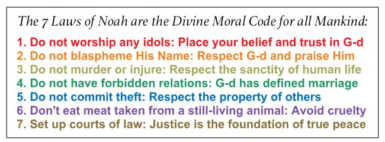Timeline for 7 Noahide Laws Given at Mt. Sinai

Timeline of G-d’s re-affirming the Seven Noahide Commandments at Mount Sinai
This is where He commanded them with specific details as part of the eternal Torah of Moses. As G-d decided for reasons known to Him, some of the verses in the Torah that refer to these events are not placed in chronological order. Here they are presented according to the order of what took place:
1st day (1 Sivan 2448) / Ex. 19:1-2. The Israelite nation encamped at Mount Sinai. This was on the 45th day after G-d led them out in their exodus from slavery in Egypt.
2nd day / Ex. 19:3-8. Moses ascended to the top of Mt. Sinai to receive instructions from G-d, and then he descended. The Israelites agreed that they would obediently enter into the Jewish covenant. This happened when they said, “Everything that G-d has spoken we shall do!”
3rd day / Ex. 19:8 (starting from “Moses brought back the words of the people to G-d”) to Ex. 19:9 (up to … “and they will believe in you [Moses], also forever”). Moses then ascended Mt. Sinai again, reported to G-d, received His next instructions, and then descended.
4th day / Ex. 19:9 (starting from “Moses told the words of the people to G-d”) to Ex. 19:14, and then the continuation skips to Ex. 24:1-4 (through “Moses wrote all the words of G-d”). Moses ascended Mt. Sinai again to receive instructions from G-d. He then descended to tell the people all the Divine laws that had been commanded up until that time.
Moses recounted and wrote the Noahide Commandments, and the Israelites accepted them, on this day, as Exodus 24:3-4 states:
“And Moses came and told the people all the words of G-d and all the laws, and all the people answered with one voice and said, ‘All the words which G-d has spoken will we do.’ And Moses wrote all the words of G-d…”
“All the laws” refers to the Seven Noahide Commandments and some of the Jewish Commandments, which the Israelites were commanded about after they left Egypt, but before they arrived at Mt. Sinai. (Moses told these commandments to the Israelites at Marah, after they crossed through the sea – see Exodus 15:25.) In Ex. 24:4, “Moses wrote all the words of G-d” means that at that time, he wrote down the Book of Genesis. It contains the verses which inform us of the earlier Covenant of the Rainbow and the Noahide Commandments. He also wrote down the Book of Exodus up to that point.
Thus, G-d commanded upon the Jewish people that based upon the revelation they would receive at Mount Sinai, they would have the responsibility for preserving and publicizing the Noahide Commandments. That includes all their details, which are for all nations of the world for all generations.
5th day / Ex. 24:4 (from “He [Moses] arose early in the morning…”) to Ex. 24:11. This is the day that Moses built an alter, and read to the people the “Book of the Covenant”. (That was the Book of Genesis, including the Seven Noahide Commandments, and part of Exodus up to that point.)
6th day / Ex. 19:16-20:18, and Ex. 24:12-15. G-d openly spoke the “Ten Commandments” to the Jewish people, and Moses then ascended Mount Sinai, to learn more of the Jewish Commandments from G-d for 40 days and 40 nights. (Many of these Jewish commandments are recorded in Ex. 20:19 to Ex. 23:22.)

Source verses for the 7 Noahide Commandments:
Five of the Noahide Commandments are explicitly found in different verses in the Book of Genesis, and one is found in Leviticus. The remaining one (and in fact all them) can be inferred from a single verse in Genesis. These are Universal Commandments given through Noah after the Flood for all mankind, and again at Mount Sinai at the time of the giving the “Ten Commandments” for Jews. The Seven Noahide Commandments are:
1. Do Not Worship a False Deity
Genesis 2:16 states: “And L-rd G-d commanded to the man, saying…” This Divine command to Adam implies that only the One True G-d, the Creator of the spiritual and physical realms, should be obeyed and honored as the Deity, and the greatest honor is to serve and worship Him. Thus, one should serve and worship only the One True G-d, and not any idol.
2. Do Not Commit Blasphemy
Leviticus 24:10-17 relates the incident of a Jew who violated the injunction of Exodus 22:27 and blasphemed in anger. Moreover, it states in Leviticus 24:15, “ish ish” (any man) who curses his G-d shall bear his sin.” Why the double expression of “ish ish” (literally: “a man, a man”)? To include all mankind, Jews and Gentiles. This demonstrates that blasphemy thus is prohibited to Gentiles even as it is for Jews.
3. Do Not Commit Murder or Injury
The edict against murder, and the punishment for this transgression, is stated in Genesis 9:6: “Whoever sheds the blood of man, among man, his blood shall be shed; for in the image of G-d He made man.”
4. Do Not Have Forbidden Sexual Relations
Five of the six types of relations that are forbidden by G-d to Gentiles are covered in Genesis 2:24: “Therefore a man shall leave his father and his mother and cling to his wife, and they shall become one flesh.” This verse explicitly forbids relations with one’s mother, with a woman who has ever been his father’s domestic partner or certified wife, with a woman who is currently a domestic partner or certified wife of another man, with another male, or with an animal.
A Gentile is also forbidden to have relations with his maternal sister, which is learned from Gen. 20:13: “Moreover, she is indeed my sister, my father’s daughter, though not my mother’s daughter; and she became my wife.” (Note that Abraham said this to appease Abimelech. It was actually only figuratively true in his case, since Sarah was the daughter of Abraham’s brother. So they had the same paternal grandfather, who people often referred to as “father.”)
It also was universally accepted that father-daughter relations would be included, as evidenced by the disgrace of Lot after he had relations with his two daughters, following G-d’s destruction of Sodom and Gomorrah (Gen. 19:29-36, and Rashi’s explanation of Gen. 20:1). Relations of a female with a female are likewise an abomination to G-d which is included as one of the subjects of the verse Lev. 18:3, which speaks against the immoral practices of the ancient Egyptians and Canaanites, and which Lev. 18:30 refers to as “abominable traditions.” About these, the Midrash (Sifra) specifies: “A man would marry a man, a woman would marry a woman, and a woman would be married to two men.”
5. Do Not Commit Theft
The prohibition of theft is contained within the permission which G-d granted to Adam and Hava (Eve) in Genesis 2:16 to eat from the trees of the garden. This implies that if the permission had not been granted, they would have been forbidden to do so, because the property did not belong to them. This applied specifically to the fruit of the Tree of “Knowledge of Good and Evil” which was forbidden for them to take, under penalty of death (Genesis 2:17). This Noahide commandment was cited explicitly by Abraham in Genesis 21:25.
6. Don’t Eat Meat that was Taken from a Live Animal
Adam and Hava (Eve) were not given permission to kill animals for food, and this remained in effect until after the Flood. G-d permitted the eating of meat for the first time to Noah and his family after they left the Ark, which is why G-d at that time added the seventh commandment, which prohibits the eating of meat that was severed from a living animal (even if it was stunned and insensitive). This commandment given to Noah is recorded in Genesis 9:4: “But meat, with its soul [which is in] its blood you shall not eat.”
7. Establish Laws and Courts of Justice
The Noahide Code specifies that Gentile societies are obligated to abide by justice through establishing a system of righteous courts of law. G-d commanded Noah regarding the trial and punishment of a murderer, as it says in Genesis 9:6, “Whoever sheds the blood of man, among man, his blood shall be shed…” This refers to a Noahide commandment to judge and penalize a murderer.This is explained as follows by the Talmudic Sages: “Whoever sheds the blood of man” (referring to the murderer), “among man” (i.e., he is to be prosecuted in a court by a man who is qualified to testify as a witness), “his blood shall be shed” (if convicted, he is liable to capital punishment by the court).
It must be emphasized that if the majority of a society permits transgression at least one of the Seven Commandments, the courts are not permitted to inflict capital punishment for any crime under normal circumstances. But if a government needs this penalty for murder only, due to a great need for more safety, it is permitted, but not required, and only if there is no prejudice in sentencing.
– By Dr. Michael Schulman, Director, Ask Noah International








